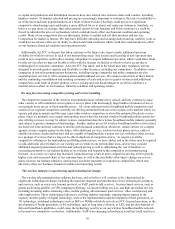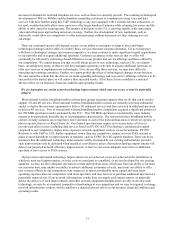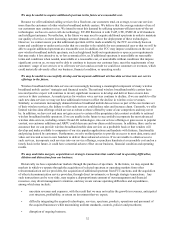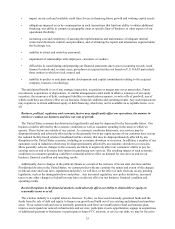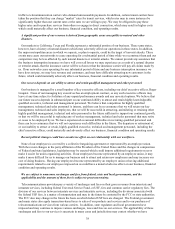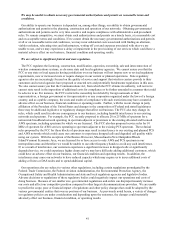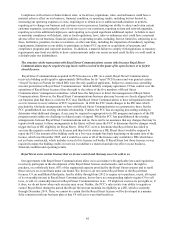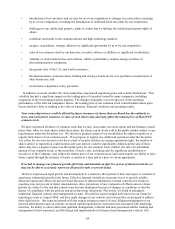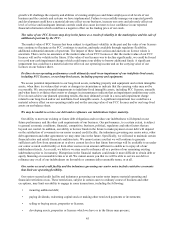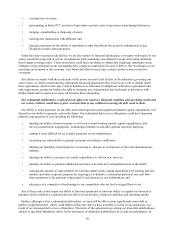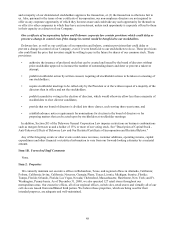Metro PCS 2008 Annual Report Download - page 48
Download and view the complete annual report
Please find page 48 of the 2008 Metro PCS annual report below. You can navigate through the pages in the report by either clicking on the pages listed below, or by using the keyword search tool below to find specific information within the annual report.39
assessed and remitted those monies correctly. Periodically state and federal regulators may increase or change the
surcharges and fees we currently pay. In some instances we pass through these charges to our customers. However,
Congress, the FCC, state regulatory agencies or state legislatures may limit our ability to pass through to our
customers’ transaction based tax liabilities, regulatory surcharges and regulatory fees imposed on us. We may or
may not be able to recover some or all of those taxes from our customers and the amount of taxes may deter demand
for our services or increase our cost to provide service which could have a material adverse effect on our business,
financial condition or operating results.
Concerns about whether wireless telephones pose health and safety risks may lead to the adoption of new
regulations or lawsuits which could decrease demand for our services.
Media reports and some studies have suggested that radio frequency emissions from wireless handsets may be
linked to various health concerns, including cancer, or interfere with various electronic medical devices, including
hearing aids and pacemakers. Additional studies have been undertaken to determine whether the suggestions from
those reports and studies are accurate. In addition, lawsuits have been filed against various participants in the
wireless industry alleging various adverse health consequences as a result of wireless phone usage. While many of
these lawsuits have been dismissed on various grounds, including a lack of scientific evidence linking wireless
handsets with such adverse health consequences, future lawsuits could be filed based on new evidence or in different
jurisdictions. If any such suits do succeed, or if plaintiffs are successful in negotiating settlements, it is likely
additional suits would follow. In addition to health concerns, safety concerns have been raised with respect to the
use of wireless handsets while driving. Certain states and municipalities in which we provide service or plan to
provide service have passed laws prohibiting the use of wireless phones while driving, or requiring the use of
wireless headsets, and other states and municipalities may do so in the future.
If consumers’ health concerns over radio frequency emissions increase, consumers may be discouraged from
using wireless handsets or services, regulators may impose restrictions or increased requirements on the location and
operation of cell sites, the use or design of wireless telephones may restrict the use of wireless handsets while
driving, or may require that all wireless telephones include an earpiece that would enable the use of wireless
telephones without holding them against the user’s head. Such legislation or regulation could increase the cost of our
wireless handsets, reduce demand for our products and services, and increase other operating expenses, or could
expose wireless providers to further litigation, which, even if not successful, may be costly to defend and could
divert management’s attention from our business. In addition, compliance with such new requirements, and the
associated costs, could adversely affect our business. The actual or perceived risk of radio frequency emissions
could adversely affect us through a reduction in customers or a reduction in the availability of financing in the
future. If any of these risks occur, it could have a material adverse effect on our business, financial condition and
operating results.
System failures, security breaches and the unauthorized use of or interference with our network could cause
delays or interruptions of service, increase our cost of operations, and result in harm to our business reputation
which could cause us to lose customers.
To be successful, we must provide our customers reliable, trustworthy service. We rely upon our networks and the
networks of other providers to support all of our services. Some of the risks to our networks and infrastructure
which may prevent us from providing reliable service include:
• physical damage to outside plant facilities;
• power surges or outages;
• equipment failure;
• vendor or supplier failures or delays;
• software defects;
• viruses and other attacks by hackers;
• unauthorized use of our or our provider’s networks;



